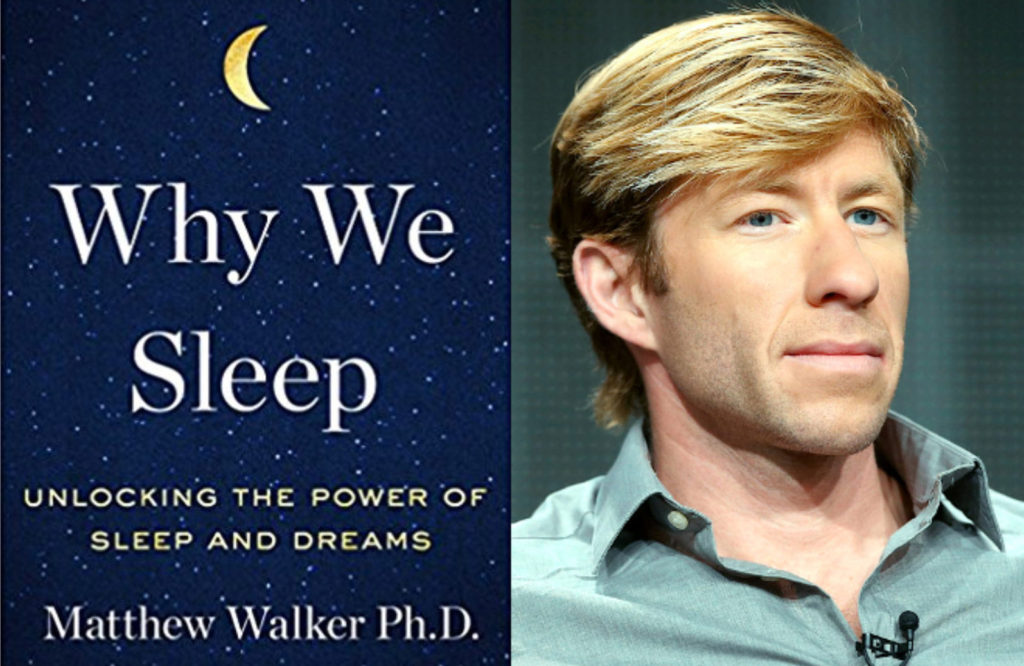
See more

Does Matthew Walker have a podcast?
The Matt Walker Podcast on Apple Podcasts. The Matt Walker Podcast is all about sleep, the brain, and the body. Matt is a Professor of Neuroscience at the University of California, Berkeley. He is the author of the book, Why We Sleep and has given a few TED talks.
Why do we sleep Matthew Walker podcast?
Today we're talking to Matthew Walker, the award winning author of bestseller 'Why We Sleep' about sleep, getting to grips with our sleep cycles, the connection between sleep and our mental and physical health, how to sleep better and why we need to make it a priority.
How does Matthew Walker increase deep sleep?
Matthew Walker's 11 Tips for Improving Sleep QualityFind a routine.Cut the late-night cardio.Reduce caffeine and nicotine consumption.Tamp down on the alcohol.Eat light at night.Talk to your doctor about your medication schedule.Leave time to unwind.Baths are best.More items...•
How much sleep do we need Matthew Walker?
Sleep Scientist Warns Against Walking Through Life 'In An Underslept State' | UC Psych. The National Sleep Foundation recommends an average of eight hours of sleep per night for adults, but sleep scientist Matthew Walker says that too many people are falling short of the mark.
Why does melatonin make you sleep?
Melatonin is a hormone that your brain produces in response to darkness. It helps with the timing of your circadian rhythms (24-hour internal clock) and with sleep. Being exposed to light at night can block melatonin production. Research suggests that melatonin plays other important roles in the body beyond sleep.
Is sleeping good for your mental health?
There's a close relationship between sleep and mental health. Living with a mental health problem can affect how well you sleep, and poor sleep can have a negative impact on your mental health. "Poor sleep leads to worrying. Worrying leads to poor sleep.
Does oversleeping make you age faster?
Oversleeping can cause the brain to age faster and make it difficult to perform the simplest daily tasks, according to research reported in the Journal of the American Geriatrics Society.
What time should I go to bed if I'm waking up at 5?
For the best chances at waking up early, set a goal for 8 hours of sleep. I want to wake up at 5 a.m., so my sleeping time is 9 p.m. (8 hours before).
What time should I go to bed if I wake up at 6?
between 9pm and 11pmIf you wake up at 6am, to get 7-9 hours of sleep you should be going to bed between 9pm and 11pm.
Can you be okay with 6 hours of sleep?
Young adults can get 7 to 9 hours of sleep as recommended by the National Sleep Foundation — with 6 hours being appropriate. Less than 6 hours is not recommended.
Does sleep heal the brain?
Recent studies have suggested that the brain, so active during the day, may use the downtime of sleep to repair damage caused by our busy metabolism, replenish dwindling energy stores and even grow new neurons.
Is 7 hours of sleep enough?
Sleep needs vary by person and are affected by several factors. However, for most adults, 7–9 hours per night is the ideal amount. Pay attention to how you feel during the day to determine whether you're getting the right amount for you. If you're sleeping enough, you should feel awake and energized during the day.
Release date: Feb. 22
Walker is a Professor of Neuroscience and Psychology at the University of California-Berkeley, and is also the founder and director of the Center for Human Sleep Science.
Here are a few highlights from the conversation
What we’ve discovered is that no one stage of sleep is more important than the other. Different stages of sleep do different things for your brain and your body at different times of the night.
Who is Matthew Walker?
Matthew Walker, Ph.D. ( @sleepdiplomat) is a sleep expert and Professor of Neuroscience and Psychology at the University of California, Berkeley, USA. He is also the founder and director of the Center for Human Sleep Science. In this episode of Rich Roll Podcast, Matthew Walker and Rich Roll take a deep dive into all things related ...
Which system kicks in during deep sleep?
The brain has a cleansing system called the glymphatic system (similar to the body’s lymphatic system) which kicks in during deep sleep
Why is sleep deprivation considered a world record?
The Guinness Book of World Record prohibits sleep deprivation records because of significant harmful side effects. Effects of sleep deprivation: psychosis, personality changes, changes in appetite, memory loss, and emotional instability.
Why is deep sleep important?
Deep sleep allows you to save memories in the brain. Non-REM and REM play for brain domination throughout the night in 90-minute cycles. Ratio of non-REM and REM throughout the night: the first half of the night is dominated by non-REM deep sleep; the second half of our sleep is dominated by REM sleep.
How much sleep is needed for mental health?
There is no mental health condition in which sleep is normal. 1 out of every 3 people are not getting enough sleep. CDC recommends a minimum of 7 hours of sleep per night to maintain health. Just one night of dysregulated sleep per week has deleterious effects.
How many hours of sleep do you need to get a cold?
Individuals who sleep less than 7 hours per night are almost 3x as likely to contract rhinovirus (common cold)
Why do we sacrifice sleep?
We don’t want to shortchange on time with family, friends, relaxation , etc. – so we sacrifice sleep
What is Matt Walker's podcast about?
Dr. Walker is also hosting the new podcast, The Matt Walker Podcast, which is all about sleep, the brain, and the body.
Who Is Dr. Matthew Walker?
in neurophysiology from the Medical Research Council, London, UK. He later became a Professor of Psychiatry at Harvard Medical School, USA. Currently, he is a Professor of Neuroscience and Psychology at the University of California, Berkeley, USA. He is also the founder and director of the Center for Human Sleep Science.
Why do couples sleep in separate rooms?
There are many reasons sleeping separately is beneficial, from sleep disorders such as sleep apnea, snoring, tossing, and turning — all of which have the effect of creating friction in relationships leading to another bad night’s sleep.
Why is regularity important in sleep?
The reason for regularity is that our brain has a master 24-hour clock and it expects regularity and thrives under those conditions. Therefore, regularity will anchor your sleep and improve the quantity and quality of your sleep.
Why is sleep important?
Sleep is a key factor in productivity, health, mood, happiness, and longevity. I appreciate that Dr. Walker is constantly researching more ways to optimize our lives. I like to end each episode with my guest’s definition of greatness, and Dr. Walker’s today sums up the important work he does:
Do couples with a strong love relationship have better sleep?
Dr. Walker’s research shows that couples with a strong loving relationship will typically both have significantly better sleep , in terms of quantity and quality. What’s more astounding is what the data shows when both partners have poor sleep.
Who said the best bridge between despair and hope is a good night's sleep?
I think this quote from the American inventor Joseph Cossman best sums it up, “The best bridge between despair and hope is a good night’s sleep.”
Who is Matt Walker?
About the speaker. Matt Walker · Sleep scientist, professor, author. Matt Walker is a brain scientist trying to understand why we sleep. Matt Walker is a brain scientist trying to understand why we sleep.
Is sleep good for you?
Sleep is your life-support system and Mother Nature's best effort yet at immortality, says sleep scientist Matt Walker. In this deep dive into the science of slumber, Walker shares the wonderfully good things that happen when you get sleep -- and the alarmingly bad things that happen when you don't, for both your brain and body. Learn more about sleep's impact on your learning, memory, immune system and even your genetic code -- as well as some helpful tips for getting some shut-eye.
